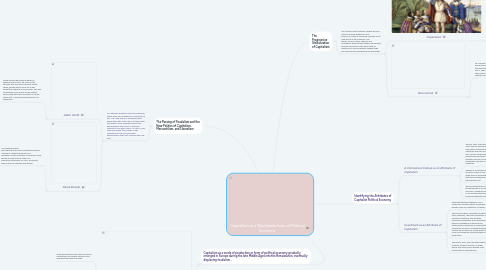
1. Capitalism as a mode of production or form of political economy gradually emerged in Europe during the late Middle Ages into the Renaissance, eventually displacing feudalism .
1.1. Aspects of globalization
1.1.1. Trade among towns and cities increased substantially as markets became more important throughout Europe
2. The Passing of Feudalism and the New Politics of Capitalism, Mercantilism, and Liberalism
2.1. As capitalism gradually displaced feudalism, states were also emerging as a new political unit. The 1648 Peace of Westphalia that ended the Thirty Years’ War concluded that the religion of the inhabitants would be determined by the prince or temporal authority in any given realm—in Latin, cujus regio ejus religio (the religion of the inhabitants of the realm as being determined by the ruler) captured this new idea.
2.1.1. Adam Smith
2.1.1.1. Smith argued that national wealth in capitalism was not to be found in the treasure that accrued in treasury vaults; rather, wealth was to be found in the productive capacity of economies. This was increasingly to be found in their capital stock along with labor and land (or natural resources), collectively termed factors of production.
2.1.2. David Ricardo
2.1.2.1. He complained that land-owning aristocrats contributed virtually nothing to capitalist production in exchange for the rents they collected as mere owners of land used by others for productive enterprise. As such, aristocrats were a drag on capitalist economies.
2.1.2.1.1. For Ricardo, protectionism (typically in the form of tariffs or taxes on imports) favored agricultural interests and denied firms and individuals the freedom to buy and sell at market prices without restriction across national frontiers.
3. Identifying the Attributes of Capitalist Political Economy
3.1. A Commercial Culture as an Attribute of Capitalism
3.1.1. The late 19th- and early 20th-century German political sociologist Max Weber observed how the emergence of capitalism was also accompanied by a new set of social values supportive not only of market-oriented trade and monetary activities but also of the savings and investment function so essential to capitalism.
3.1.2. Religion is so deeply embedded in a society’s culture or set of values that it is often difficult to distinguish between values that have a religious grounding and those that do not.
3.1.3. The important point for us, however, is to recognize that as a form of political economy, capitalism has its own “culture” or set of supporting values, just as European feudalism had.
3.2. Investment as an Attribute of Capitalism
3.2.1. What distinguishes capitalism from feudal and ancient political economies is its greater need for investment of capital.
3.2.2. The tools and hand-operated machines of early capitalism, the heavy machinery of industrial capitalism, and the high technology machinery and computers or artificial intelligence of advanced or postindustrial capitalism all require that substantial amounts of capital resulting from savings be put aside for investment in these tools and machinery that are essential to production.
3.2.3. The plants, tools, and machinery that are essential to the production of other goods and services are referred to by economists as capital goods
3.2.3.1. Capital goods have no value to us in themselves other than their contribution to the production of other goods or services we do value or want to produce for consumption.
4. The Progressive Globalization of Capitalism
4.1. The 17th and 18th centuries marked the first wave of imperial expansion from Europe, focusing on acquiring colonies in the New World of the Americas. The British, French, Dutch, Spanish, and Portuguese were the key players. Mercantilist policies dominated in this early stage of capitalism as colonial powers sought trade and commercial advantages over each other.
4.1.1. Imperialism
4.1.1.1. Effectively spread capitalist political economy throughout the globe to distant parts of Africa, Asia, and the Pacific
4.1.2. Neocolonial
4.1.2.1. As colonies in Africa, Asia, and the Pacific became independent, particularly in the first quarter-century after World War II, their capitalist political economies were often linked by neocolonial ties with the former colonial power.
